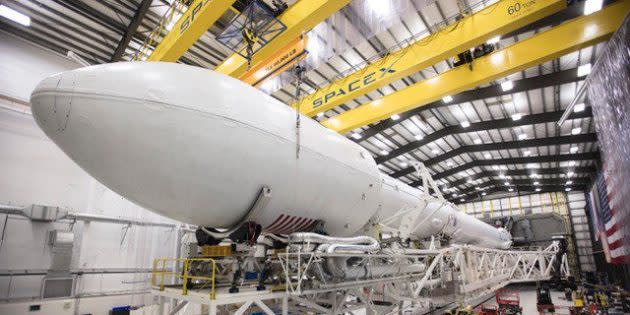SpaceX gets ready to return to flight amid revelations about rocket finances

As SpaceX prepares for its first Falcon 9 rocket launch in five months, a new report about the company’s finances is pointing to the importance of getting back to routine operations – and the importance of SpaceX’s satellite operation in the Seattle area.
Today’s report in The Wall Street Journal is based on a look at the privately held company’s internal financial documents. Those documents indicate that the company lost $260 million on revenues of nearly $1 billion in 2015. The main factor behind that loss was the schedule disruption caused by the breakup of a Falcon 9 shortly after liftoff in June of that year.
SpaceX traced the cause of that failure to a flawed helium tank strut, and resumed launches the following December. Over the months that followed, it succeeded in its strategy of landing Falcon first-stage boosters after launch and separation. But last September, a launch-pad failure forced another suspension of flights.
September’s pre-launch explosion destroyed the Amos-6 telecommunications satellite and did heavy damage to the Florida launch pad. Just last week, SpaceX issued a report that blamed the blow-up on a helium tank failure and said it was changing its fueling procedures to head off further problems.
Now SpaceX has the go-ahead to launch 10 advanced Iridium Next telecommunications satellites from Vandenberg Air Force Base in California on a Falcon 9. Liftoff is scheduled for 9:54 a.m. PT Saturday, with a 60 percent chance of acceptable weather.
SpaceX plans to live-stream coverage of the countdown, launch and anticipated booster landing at sea.
The California-based company is anxious to get its launch schedule back on track. It has more than 70 launches stacked up, representing more than $10 billion in contracts. Those launches including cargo resupply flights to the International Space Station and the first liftoff of its Falcon Heavy rocket, which been repeatedly postponed over the course of four years.
A couple of launches have been shifted to other providers due to schedule concerns, but so far, SpaceX’s customers have voiced strong support for the company. “Our confidence in them is not shaken,” Iridium’s chief financial officer, Thomas Fitzpatrick, said after the mishap in September.
Over the past few years, SpaceX has revolutionized the launch industry by dramatically reducing the cost of access to orbit. Its published price for a Falcon 9 launch is $62 million, which is just a little more than half the cost of a bare-bones Atlas 5 rocket launch.
SpaceX’s chief financial officer, Bret Johnsen, indicated that the company has weathered its recent setbacks thanks to its past successes – and deep pockets.
“With over $1 billion in cash reserves and no debt, the company is in a financially strong position and is well positioned for future growth,” Johnsen said today in a statement.
The Journal’s report suggests that one of the keys to that future growth will be a 4,425-satellite constellation that SpaceX plans to put into orbit to provide global internet access.

SpaceX’s engineering office in Redmond, Wash., has a leading role in developing the satellite network. The company’s schedule calls for the first wave of satellites to be deployed in the 2018-2020 time frame.
When SpaceX founder Elon Musk announced plans for the satellite operation during a Seattle visit in 2015, he said it would “generate a significant amount of revenue, and help fund a city on Mars.”
The Journal’s report suggests that Musk wasn’t kidding. It cites documents anticipating that the satellite network would have more than 40 million subscribers and bring in more than $30 billion in annual revenue by 2025, which is just about when Musk expects to start sending settlers to the Red Planet.
The documents also indicate Musk owned 54 percent of SpaceX stock in 2015 and held 78 percent of the company’s votes. Google’s holding company, Alphabet, and Fidelity Investments have significant stakes in the company – and Fidelity’s valuation of its stake suggests SpaceX is valued at $15 billion.
SpaceX isn’t alone in setting its sights on sateliite internet services as a financial frontier: Another venture called OneWeb is planning to start deploying a similar network by 2019. Just last month, Japan-based SoftBank Group announced it would invest $1 billion in OneWeb, joining an array of global industrial heavyweights.
